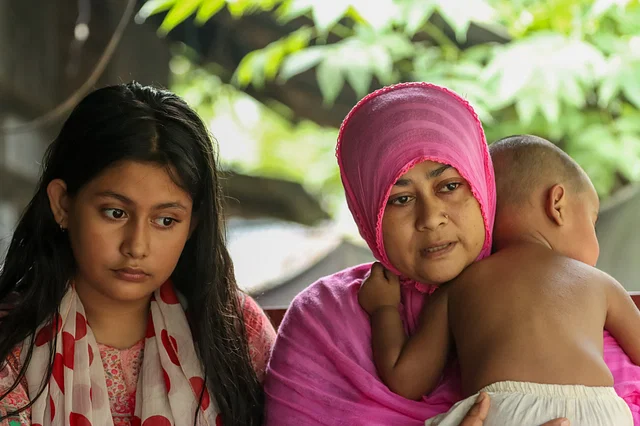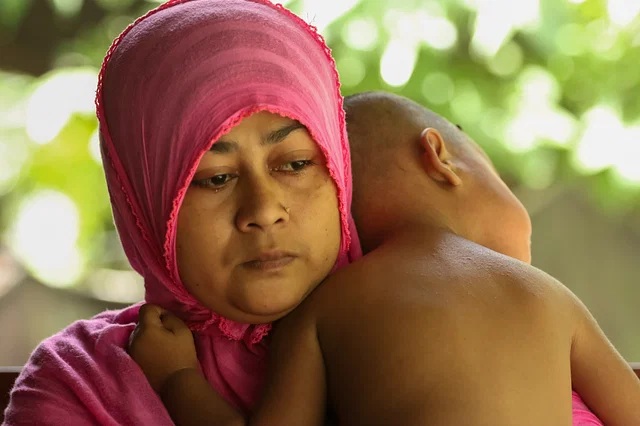“Now where should I go to lodge a complaint, Father…” Sumai Akter (28) has been silent and mute for over a week. She is the wife of Jasim Uddin (35), who was shot dead during the quota reform movement in Dhaka. Since hearing about her husband’s death, Sumai has refused to eat. Although family members have insisted, she has only been able to eat a little over the past two days and has not spoken to anyone. Her 10-year-old daughter, Jannatul Ferdous, has become as silent as her mother. The little girl has been devastated by her father’s sudden death.
The remote village of East Salikabankpur in Banaripara Upazila of Barishal is situated a distance away from the Barishal-Banaripara road. A narrow paved road branches off to the northwest from this main road. Continuing down this road and then taking another narrow path beside a madrasa, one reaches a muddy, waterlogged area due to recent rain. Yesterday, Thursday afternoon, when we visited Jasim Uddin’s house, it was surrounded by lush greenery. Upon entering the house, Jasim’s grave came into view. Jasim’s brother, Shahabuddin, with tearful eyes and his hand raised, pointed and said, “My brother is lying there.” The small tin house was filled with silence. Shahabuddin called out to his elder brother Nizam Uddin from inside the house to the veranda. Upon learning the identity of this reporter, Nizam Uddin broke down in tears, saying, “My brother never engaged in politics. He worked a small job in Dhaka for a salary of 20,000 Taka and sent money home for his wife and children. Everything is over in an instant.” Nizam then collapsed into tears.

The wife of the deceased Jasim Uddin, Sumai Akter (on the right). Her one-and-a-half-year-old son Saif is in her lap. Next to her is her eldest daughter Jannatul Ferdous. The photo was taken in the village of East Salikabankpur, Banaripara Upazila, on Thursday afternoon. Photo: Saiyan
At that moment, Jasim’s one-and-a-half-year-old son Saif was sleeping on Shahabuddin’s shoulder. Nearby, Jasim’s daughter Jannatul Ferdous, observing her uncle’s tears, kept her head lowered. Tears silently rolled down her cheeks.
Through her sobs, little Jannatul said, “On the day Father died, at noon, he had called me and said, ‘When you leave school, bring some fruit for Grandma from your uncle’s shop (a familiar local shop). I will pay for it later.’ That was the last thing I heard from my father.” Saying this, Jannatul broke down completely, sobbing uncontrollably. She said, “If Mother and I had a fight, I would call Father. He would say, ‘I will scold your mother a lot when I come home.’ Now, who should I complain to, Father…!” Nizam Uddin explained that Jasim was the middle brother among four. Jasim had moved to Dhaka years ago for work. Besides the ancestral land, they had no other property. The four brothers live away from home and work in various private companies. Their families stay in their ancestral home. Their father, Abdul Mannan, passed away in 2020 due to illness, and their mother is currently bedridden due to a stroke. The four brothers earn low salaries and barely manage to sustain their families. But now, with one brother gone unexpectedly, their situation is even more precarious.
Nizam Uddin said that Jasim worked at an automobile store in Uttara and lived in the store’s garage. On July 18, under the owner’s instruction, he and a colleague went to Uttara 7 for car parts. On their way back, Jasim was shot and died on the spot. A bullet had pierced his chest, and his face and body were covered with rubber bullet wounds. Upon hearing the news, Nizam rushed from his workplace in Chattogram to Dhaka. After receiving the body on the night of July 18, he brought it back home on the early morning of July 19. After the funeral prayer, he was buried there. Nizam added, “My brother is dead; now whom should we seek justice from? Who will give us justice? We are poor and struggling to survive, and after that, justice?”
The afternoon passed. As we prepared to leave, Sumai Akter, Jasim’s wife, came out to speak. Her shoulders bore the sleeping child Saif, still deeply immersed in sleep. Her devastated appearance made it clear how much turmoil her life had been through. Breaking her silence, she said only, “I don’t know where to go or what to do with these little children now.” Her vacant gaze and tearless eyes seemed to have no more tears left.










